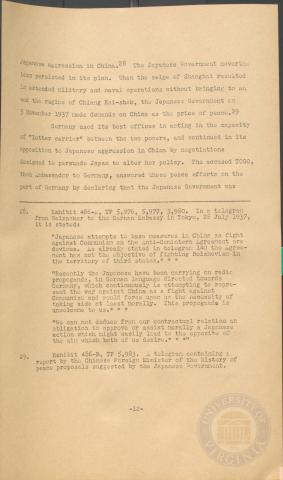
Page 12
| Parent | Japanese - German - Italian Collaboration |
|---|---|
| Date | |
| Language | English |
| Collection | Tavenner Papers & IMTFE Official Records |
| Box | Box 14 |
| Folder | Japan, Germany, Italy Collaboration and Introduction |
| Repository | University of Virginia Law Library |
Japanese aggression in China.28 yhe Japanese Government never the' less persisted in its plan. Y/hen the seige of Shanghai resulted in extended military and naval operations without bringing to an end the regime of Chiang Kai-shek, the Japanese Government en 5 November 1937 made demands on China as the price of peace.29
Germany used its best offices in acting in the capacity of "letter carrier11 between the two powers, and continued in its opposition to Japanese aggression in China by negotiations designed to persuade Japan to alter her policy. The accused TOGO, then Ambassador to Germany, answered these peace efforts on the part of Germany by declaring that the Japanese Government was
28Exhibit 486-A, TP 5,976, 5,977, 5,980. In a telegram from Weizacker to the German Embassy in Tokyo, 28 July 1937, it is stated:
"Japanese attempts to base measures in China as fight against Communism on the Anti-Comintern Agreement are devious. As already stated in telegram 140 the Agree¬ment has not the objective of fighting Bolshevism in the territory of third states.* * *
"Recently the Japanese have been carrying on radio propoganda, in German language directed towards Germanywhich continuously is attempting to repre¬sent the war against China as a fight against Communism and would force upon us the necessity of taking side at least morally. This propoganda is unwelcome to us.* * *
"We can not deduce from our contractual relation an obligation to approve or assist morally a Japanese action which might easily lead to the opposite of the aim which both of us desire.* * *"
29Exhibit 486-B, TP 5,983. A telegram containing a report by the Chinese Foreign Minister of the history of peace proposals suggested by the Japanese Government.
